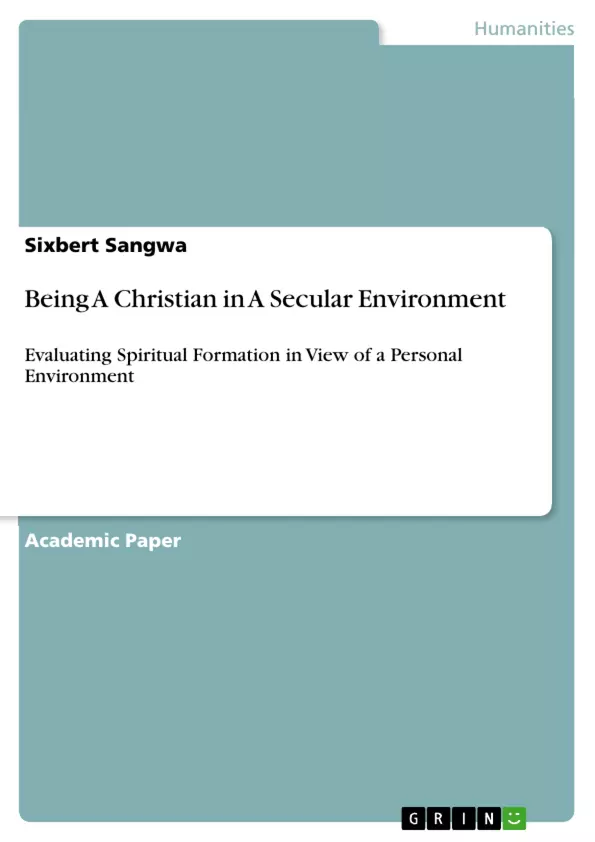This paper provides what being a Christian in a secular environment means for an individual.
While being academician, I have been trained in science during my young age and I was convinced about believing demonstrable things and taking informed decisions, that is, reality that is based on demonstration. One way to live my Christian life has been a struggle to interpret the Bible in light of scientific discoveries.
Yes, I feel and can see the power of God, but why do the creation stories in Genesis 1 and 2 differ from the scientific evolution account about the origin of life? Perhaps an answer could be, it was too early for God to explain the matter in scientific terms because ordinary people, like me who are new to science, could not understand, so He preferred to simplify it. Yes, at one end, I stood with the desire to know everything in the cosmos but that could make me doubt and eventually unbelief in God
Inhaltsverzeichnis (Table of Contents)
- I. Evaluating Spiritual Formation in View of a Personal Environment
- 1.1. Introduction
- 1.2. Rationality and the cosmos
- 1.3. A wrestle with desire to find myself in the world
- 1.4. Human nature of sin
Zielsetzung und Themenschwerpunkte (Objectives and Key Themes)
This paper presents the author's personal journey of navigating his Christian faith within a secular environment. It explores the challenges of reconciling religious beliefs with scientific understanding, the allure of materialistic desires, and the human propensity for sin. The paper aims to reflect on spiritual formation within the context of the author's own experiences and challenges, particularly in the realm of business and entrepreneurship.
- The struggle to reconcile Christian faith with scientific discoveries
- The impact of materialistic desires on Christian ethics
- The role of spirituality in navigating the challenges of a secular environment
- The importance of maintaining a spiritual balance within daily life
- The challenges of human nature, including sin and temptation, in a business setting
Zusammenfassung der Kapitel (Chapter Summaries)
- 1.1. Introduction: The author introduces his personal struggle to balance his Christian faith with the materialistic pressures of modern life. He acknowledges the allure of wealth and the temptation to compromise his ethics in the pursuit of material gain. He connects this struggle to a sense of unhappiness and spiritual vulnerability.
- 1.2. Rationality and the cosmos: This section examines the author's attempt to reconcile his faith with scientific understanding. He questions the scientific account of the origins of life, particularly in light of biblical creation stories. The author explores the limitations of science and the power of dreams, considering both their potential spiritual and psychological significance.
- 1.3. A wrestle with desire to find myself in the world: The author reflects on the challenges of living as a Christian entrepreneur in a secular environment. He acknowledges the pull of material desires and the need to maintain a spiritual balance in the face of these temptations. The section highlights the importance of recognizing God's sovereignty and finding spiritual fulfillment in the midst of worldly pursuits.
- 1.4. Human nature of sin: This section explores the inherent human propensity for sin, particularly in business settings. The author observes that even within a Christian context, individuals can be tempted to compromise their ethics and succumb to greed and other worldly desires. The section draws attention to the potential for these temptations to lead to ethical dilemmas and conflict within a business setting.
Schlüsselwörter (Keywords)
This paper centers on the themes of spirituality in daily life, Christian ethics, personal spiritual testimony, the intersection of Christianity and secularization, and the challenges of human limitations in relation to spiritual awareness. It explores the experiences of a Christian individual navigating a materialistic and secular environment, particularly within the context of entrepreneurship.
Frequently Asked Questions
What is the main theme of this personal paper?
The paper explores the author's journey of being a Christian in a secular and materialistic environment, focusing on the struggle to balance faith with science and business ethics.
How does the author reconcile Genesis with scientific evolution?
The author suggests that God might have simplified the creation story because people at the time were not ready for scientific explanations, though he still struggles with these conflicting accounts.
What challenges does a Christian entrepreneur face according to the text?
Key challenges include the allure of wealth, the temptation to compromise ethics for material gain, and maintaining a spiritual balance in a competitive business setting.
What role does "human nature of sin" play in the discussion?
The author reflects on how the inherent propensity for sin can lead to greed and ethical dilemmas, even for individuals within a Christian context.
What is the significance of spiritual formation in this work?
Spiritual formation is viewed as the ongoing process of navigating worldly desires and scientific doubts while recognizing God's sovereignty in daily life.
- Quote paper
- Dr. Sixbert Sangwa (Author), 2021, Being A Christian in A Secular Environment, Munich, GRIN Verlag, https://www.hausarbeiten.de/document/1020944


